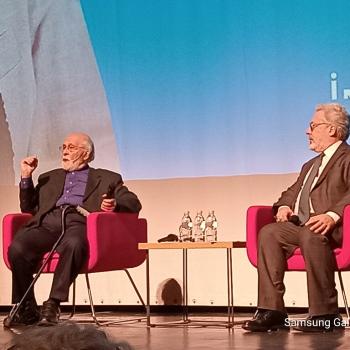
Two different, but similar, temptations turn us away from the needs of the present moment. One is to have us dream about some utopian future, thinking we can and will produce the perfect society. Such futurism, of course, is denied by those who feel the world and everything in it is falling apart, becoming worse by the day, so that instead of looking to the future, such people look to the past for their ideal society, creating a romantic vision of what they believe things were like, saying that we should find a way to return to the past if we want social perfection. Both temptations turn us away from the present moment, from the good found in it, so that we either look forward or backward to find solutions to the problems at hand, of ideals which we think we can enact instead of dealing with them with realistic expectations. While both temptations have elements of truth involved with them, so that we can and should expect some of our problems to be solved (after all, we have seen how science has cured many diseases), and we can learn from the wisdom of the past and how they dealt with similar problems, we must recognize that the root problems of the human situation such as selfishness and greed will remain with us until the end of time. Any belief we can do away with them is pure fantasy. It seems to me that it is the temptation to reconstruct the past and use that reconstruction to impose upon the present an unreal expectation which is the most common of the two temptations; futurists which look to and ponder the future with hope at least understand such purity has yet to exist and realize if it is to exist, it will require evolutionary change to get there, making them less likely to expect that they can instantly turn the present into their ideal society. It is this temptation, this desire for some ideal past, that can also create the greatest harm in the present, because the present has situations and contexts which could not and would not be understood by the way things were in the past. This means that those who try to recreate the past will end up demolishing and destroying the present and all those situations which cannot neatly fit with the past they want to recreate, and in doing so, there is likely to be much violence, both from those who try to impose their order as well as those who resist it knowing that it cannot and will not work in the present. This is exactly the problem which lies with those, either in religion, or in politics, try to impose some sort of “originalism” or false “tradition” as the means by which religious or political decisions are to be engaged.
J.R.R. Tolkien understood the problem of originalism in religion. His criticism of those who try to appeal to some form of primitivism in the faith and impose it upon others applies to those who try to follow the same sort of primitivism in secular society. The past is always going to be a construct, and so how we interpret the past will not be the past as it really was, but the past filtered through our own desires. This means that we are projecting ourselves and our wishes upon the past, using the past as a cover to hide that fact. But, as Tolkien also pointed out, even if we could properly reconstruct what things were in the past, it is never good to try to impose the way things were in the present situation because our context is much different. Thus, he said, the church is like a tree; it has its foundation as a seed, but now it grown with a trunk and limbs; it would be wrong to try to take the tree back to its origin, to compare the tree as it is now as with the way it was in its foundation and demand us to become as it was when it was just a seed:
The ‘protestant’ search backwards for ‘simplicity’ and directness – which, of course, though it contains some good or at least intelligible motive, is mistaken and in vain. Because ‘primitive Christianity’ is now and in all spite of all ‘research’ will ever remain largely unknown; because ‘primitiveness’ is no guarantee of value, and is and was in great part a reflection of ignorance. Grave abuses were as much an element in Christian ‘liturgical’ behaviour from the beginning as now. (St. Paul’s strictures on eucharistic behaviour are sufficient to show this!). Still more because ‘my church’ was not intended by Our Lord to be static or remain in perpetual childhood; but to be a living organism (likened to a plant), which develops and changes in externals by the interaction of its bequeathed divine life and history – the particular circumstances of the world into which it is set. There is no resemblance between the ‘mustard-seed’ and the full-grown tree. For those living in the days of its branching growth the Tree is the thing, for the history of a living thing is a part of its life, and the history of a divine thing is sacred. The wise may know it began with a seed, but it is vain to try to dig it up, for it is no longer exists, and the virtue and powers that it had now resides in the Tree. [1]
It is not, of course, Protestants alone who fall for the temptation to seek after an ideal “primitive” church; it is the root problem of so many so-called “traditionalists,” Catholic and Orthodox alike, who do not understand the living dynamic of tradition. The church has always been changing to deal with the context in which it is found; in doing so, there will always be good which it produces, and bad which will cause it problems, bad which will need to be excised as the church continues to develop until the end of time. Tradition, and the teachings and wisdom found in it, can and should be engaged, but it should be engaged with prudence, looking to see how it works within the present context, how it can be adapted while remaining true to itself. This is what keeps tradition from being legalism.
The problems which prevent us from finding an original, pure form of the faith which can be imposed upon the faithful today are the same problems which underlie those who claim to follow “originalism” in a political context, such as those who embrace “originalism” in the United States legal community. Once again, they try to create an ideal past, an ideal, original “interpretation,” of the texts which they claim to follow and use; but the reality is, there was no one interpretation, no one original intent; one can find a diversity of beliefs, practices, wishes and desires for the United States by the so-called “founding fathers” and no matter how one can try to do so, their diversity cannot be simplified to one single position, one single interpretation to use in judgments. Likewise, it is clear that many of the “founding fathers,” like Jefferson, did not think the United States should limit itself in its understanding based upon what they said and did, but understood things would evolve, and interpretations and legislations would have to change, so much so, they even believed that the Constitution would have to be rewritten. Originalism, therefore, ignores and rejects many of the opinions and understandings of the “founding fathers,” and in doing so, shows itself to be self-contradictory, similar to the way “sola scriptura” is self-contradictory because the principle of “sola scriptura” is not found in Scripture. What those who follow “originalism” do is exactly the same as those who try to recreate a pristine primitive version of the church to follow: they ignore all counter-evidence to their own interpretation so that they can impose upon the present their own desires.
Originalism, in its religious form (so-called “traditionalism” which tries to reify tradition through an overly-simplified and imaginary interpretation of it) as well as in its secular form (such as found in American conservative circles) is a farce; it is a rhetorical device which hides the truth from those who use it, that is, the truth that they are imposing on their own present ideology upon society while falsely claiming its source is to be found in the past instead of themselves. They can and will cite examples from tradition to support their view, but they will do so ignoring the greater, more complex tradition, and often they will do so through equivocation (because the meaning of words have changed, and they will forget that as they interpret what was written in the past). Thus, Michael Dorf was right in saying, “ In the most hotly contested cases that come before the Supreme Court, arguments rooted in original meaning typically serve a rhetorical function. Justices invoke them to justify decisions taken on other, ideological, grounds”.[2] Indeed, it can be said that it was a racist ideology which served as the foundation for present day American “originalism.” Social justice developments in the twentieth century angered many of those in power, and so, as a response to Supreme Court decisions, they created their originalism as a response to deny what the Supreme Court decided. Thus, as Stern pointed out, originalism was formed by racists upset that their racist policies were no longer supported by the Supreme Court:
All of which raises an important question: Where, exactly, did originalism come from? Its proponents frequently assert that it is a reaction to freewheeling liberal judicial activists imposing their own views on the Constitution through an approach often called “living constitutionalism.” In a groundbreaking article published in American Political Science Review, however, University of Chicago Ph.D. candidate Calvin TerBeek argues that modern originalism arose out of the backlash to Brown v. Board of Education, the landmark 1954 Supreme Court decision prohibiting public school segregation. TerBeek’s research—which spanned 14 archival collections, thousands of newspapers and magazines, and interviews with key players—all points in one direction: Originalism has fundamentally racist roots.[3]
And so, through his analysis of how originalism formed, and how originalism works, Stern noted that it continues to be a subjective theory used to justify the ideological desires of various conservatives:
The politics of it never change. You can go from original intent to original public meaning, but the same politics are always driving the bus. It’s not an objective theory. It’s a deeply, inherently political one. And what that move did more than anything else, theoretically, was give conservatives a wider terrain of space to have a more proactive originalism, one that was not simply interested in cutting down Brown and the Warren court but also laying the groundwork for a more muscular, proactive conservative jurisprudence. [4]
This is why we find ourselves in a dangerous situation in the United States when so many Supreme Court Justices claim to be originalists. At best, they are trying to recreate a past which did not exist, falling for the failure of all those who engage some sort of primitive idealism, but at worst, they are nihilistic relativists who know that originalism is self-defeating but use it as an excuse to justify their own rejection of the authentic, living tradition of the state. Certainly, we have to take what they say with as much charity as possible, so we must respond to the way they describe their originalism, when they do so, such as when Amy Coney Barrett explained what it meant for her:
Barrett, who declared herself a “constitutional originalist” had no trouble answering: “In English that means that I interpret the Constitution as a law, and that I interpret its text as text, and I understand it to have the meaning that it had at the time people ratified it. So that meaning doesn’t change over time and it’s not up to me to update it or infuse my own policy views into it.”[5]
The problem of Barrett’s originalism is that it leaves us with a hermeneutical problem; the context she comes from is vastly different from the past, so her reading will never be the same as those who read the texts when they were produced. She is infusing her own views upon the past, just as so-called “traditionalists” impose their readings of tradition to justify their own ideological perspectives and reject the church and its leaders when they do not follow their ideology. Thus, there was no one meaning for the Constitution when it was ratified, just as there was no one reading and understanding of Scripture by the saints, and so what she, and others like her, do is selectively read the past, take what they want from it, and use it to justify their desired conclusion. And as so many so-called “traditionalists” do not understand the hermeneutic problem and the way they project their views unto the past, it is quite possible, indeed, probable Barrett meant what she said, but she is not conscious of what is going on in her readings of the past. It is an ignorance of the past which allows for this, the ignorance which Tolkien said lies in those who try to follow some form of primitivism. This is why many who respond to Barrett, and other so-called originalists, just as those who respond to so-called traditionalists, will follow their own example and respond to them in kind, showing them the tradition and interpretations they have ignored. Harry Litman says, within the American legal system, this means everyone has become, in some sense, an “originalist”:
The terms of the battle will be the determinative sense of “original meaning.” I expect that we will see Kagan and others on the left battle with the majority on the originalist playing field, but with arguments, derived from cases such as Bostock, that highlight the evolved social understanding of the import of fixed constitutional terms such as equal protection and due process. Those terms, it is commonly agreed, set out unchanging principles; but social understanding progresses over time in a way that necessarily alters our best judgments—and a court’s—of which practices those terms reach. A court must apply original meaning, the Constitution’s unchanging principles. Yet it can’t ignore changes—or to use a dreaded term, evolutions—in social understanding of what those principles require in practice. So we may all be originalists now, but not in the way many originalists themselves might imagine it.[6]
Litman is wrong in trying to equate those who respond to the originalists with being originalists themselves. Responding to them in kind, showing how faulty their originalism is, only serves to overcome their ideology. This is because it shows that their interpretation and conclusions do not necessarily follow what they claim to hold, that is, the original opinions of those who established the Constitution. By doing this, their critics are not embracing originalism, but offer its repudiation through deconstruction, just as those who engage the full diversity of religious tradition and learn from it are not to be confused with the so-called “traditionalists.” The critics of originalism and so-called “traditionalism” do not disagree with the interest in and examination of the original context and interpretation, but they see and understand, when that is done, the original context itself denies itself as being a limit to be imposed upon future generations. Those who accept the way things change and develop follow tradition because the origin of all tradition came from such change and development, while those who try to halt such development in the name of tradition end up being its ultimate critic and denier. This is why originalism (and so-called “traditionalism”) is a farce, for it must reject the method and mode of engaging the world found in tradition to form its reified presentation of tradition itself. But this is also why those who do this kind of criticism are not originalists themselves (just as others who embrace tradition are not “traditionalists”), because by following the method and expectation of the past, they allow for proper development and change, to make sure that the needs of the present are met instead of cutting them off because they could not have been seen or understood in the past.
[1] J.R..R. Tolkien, “Letter 306: To Michael Tolkien” in J.R.R. Tolkien, The Letters of J.R.R. Tolkien. Ed. Humphrey Carpenter (Boston: Houghton Mifflin Company, 1981), 394.
[2] Michael C. Dorf, “A Question By Justice Thomas During The Second Amendment Argument Inadvertently Exposes A Weakness Of His Originalist Philosophy” in Verdict (11-10-2021).
[3] Mark Joseph Stern, “The Conservative Movement’s Favorite Legal Theory Is Rooted In Racism” in Slate (4-06-2021).
[4] Mark Joseph Stern, “The Conservative Movement’s Favorite Legal Theory Is Rooted In Racism.”
[5] Mark Ira Kaufman, “Trust Me…. I’m An Originalist” in Daily Kos (12-05-2021).
[6] Harry Litman, “Originalism, Divided” in The Atlantic (5-21-2021).
Stay in touch! Like A Little Bit of Nothing on Facebook.
If you liked what you read, please consider sharing it with your friends and family!












